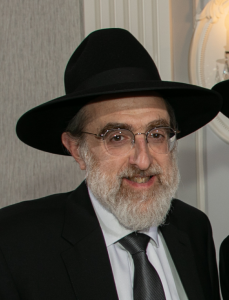Spotlight on…
Rabbi Dovid Finkelman, Menahel of Mesivta
Rabbi Dovid Tillim, Menahel of Elementary School


Business Name and Position: Yeshiva and Mesivta Toras Emes Kamenitz
Years as Menahel: Rabbi Finkelman – 25 years, and Rabbi Tillim – 6 years
Location: 1904 Avenue N
What makes a good rebbi?
Rabbi Finkelman: A rebbi needs to have a natural talent for teaching. He must be well versed in the material, well prepared, and have the ability to properly give it over and make it interesting. He needs to care for the boys and understand them at their level. He has to give over his passion for Torah and Yiddishkeit to the talmid. He should be able to not just teach Torah, but live Torah. The most important thing is for a rebbi to teach by example. A talmid should see a living example of what a true ben Torah should look like.
Rabbi Tillim: A rebbi is a role model, someone who motivates his talmidim to want to be like him simply by his example. He is joyful to be a yid; he loves Yiddishkeit. Torah is the best thing in the world. Connecting with Hashem through tefillah is the greatest pleasure. The boys feel this, and they too want to access this joy! A rebbi should be passionate about the zechus of being Hashem’s shaliach. Good classroom management and teaching skills are vehicles by which we impart Torah, and the foundation for the rebbi’s work.
How do you deal with a talmid who doesn’t love learning?
Rabbi Finkelman: Every child wants to succeed, and if he is not succeeding, we need to figure out why. Is it a learning issue? Are there problems at home? Is he getting adequate sleep? We need to find the source of the problem. Focusing on the bachur’s strength is what will breed success. I once had a talmid who was struggling terribly with his learning. Once, he asked a good kasha, and I made sure to make a big deal out of it. Later, one of the top boys called him to get more information on this kasha. The boy began to flourish. He just needed that extra boost of confidence. A bachur needs to be taught that every minute of limud Torah and every word he learns is a huge accomplishment and an integral part of his life. Just like the story of Rabbi Akiva and the rock, you may not see it right away, but every drip has an impact. Every little step he takes will eventually lead to success. We also need to impart to a bachur the impact his learning has on himself and the world.
Rabbi Tillim: There is no talmid who consciously chooses not to learn. Every child wants to be successful, and if he is in yeshiva, he would love to be successful by yeshiva standards. If he doesn’t, it’s because he is challenged by something, a roadblock to his success. It is our job as mechanchim to find that challenge, and help the child overcome it. The rest will be done through his innate desire to succeed, and through siyata diShmaya.
What are some of the challenges unique to today’s talmidim?
Rabbi Finkelman: Learning requires serious concentration, and life today is full of distractions. Today’s bachurim are bombarded with so much information about so many different things that the fact that they shteig is literally a miracle. Technology is the greatest distraction, but there are many others as well. My Rebbi, Rav Tuvia Goldstein, zt”l, told me 20 years ago that a blatt learned then was worth 100 blatt when he was a bachur because the distractions were so much greater. I can’t imagine how much more a blatt is worth today.
Rabbi Tillim: In my opinion the biggest factor that has changed from when we were children is the level of attention and quality time that parents are able to give their children. A child who receives the necessary love and nurture from his parents is a confident and resilient child who can overcome many obstacles. We live in a time when both parents in most families work due to financial pressures. Parents are too overwhelmed to give their children the adequate amount of nurturing. What follows is that parents seek to be the “friends” of their children, rather than their parents. It is imperative that parents spend quality time with their children, display interest in their lives, and ensure that their children know and feel that their parents are there for them, and that they are their parents’ most important priority.
How do you deal with technology?
Rabbi Finkelman: We discuss openly and explain what the long-term effects of technology can be. To struggle is normal but we must learn to deal with the challenge and grow from it. Bachurim need to be given the tools to enable them to fight and win. They need to be empowered with yiras Shamayim to have the strength to resist the temptations. A bachur needs to feel comfortable to share his challenges with his rebbeim. Rebbeim need to understand how to deal with each bachur on his level. It’s not about perfection, but rather the direction and proper attitude of growing one step at a time. Every time one rises to the challenge it brings Hashem incredible nachas.
Rabbi Tillim: We regularly educate our talmidim about the dangers of technology, and we have a media turnoff program, which rewards our talmidim for time away from devices. It’s the parents’ responsibility to teach their children that technology is not a right, it’s a privilege, and make sure that every last device that is brought into their home is safe. To that end each parent is regularly made aware that even one unfiltered device in the home can spell calamity for their children, Rachmanah litzlan.
What’s the ideal parent-mechanech relationship?
Rabbi Finkelman: It should be a relationship of mutual respect and open communication. Parents should feel comfortable calling and asking any questions, and their calls should be returned promptly. Rebbeim need to teach their students to respect their parents, and parents need to teach their children to respect their rebbeim. A talmid should never hear anything negative about his parents from his rebbi, nor should a child hear anything negative about his yeshiva from his parents. If all issues are discussed internally, then the relationship will surely flourish.
Rabbi Tillim: One that is built on trust and transparency, and mutual respect. Both parties have the responsibility to invest in this relationship, and to ensure that the other knows that they are valued and trusted and has the best interest of the child at heart.
What are some of the programs that you’ve implemented and why?
Rabbi Finkelman: Our yeshiva is truly the out-of-town yeshiva in-town, with talmidim having the best of both worlds. They love being in yeshiva, and are there seven days a week, day and night, but they have their homes and families as well. Our yeshiva’s greatest success is our nightly program of voluntary sedarim, complete with structured shiurim and incentives for each grade, and refreshments and transportation home at all hours. Every Yom Tov, there are mesibos, in yeshiva as well as in the homes of our rebbeim. There is a full voluntary Motzoei Shabbos program, complete with seder, raffles for sefarim, gym and melaveh malkah. Possibly the highlights of the year are the two incredible Shabbosos – one in the Catskills and one in the Poconos.
Rabbi Tillim: Our belief is that a yeshiva should not only have a curriculum to teach children Torah, but also a curriculum that gives children experiences in Yiddishkeit. Every period in the year and every Yom Tov has its special mission and richness, enabling us to grow. Whether the kedushah of Shovavim, matzah baking before Pesach, a hachana l’kaballas haTorah program, and so much more, our goal is to bring the rich experience of our heritage to our talmidim in the hope that they will continue to see these times in a new light every year for the rest of their lives.
What are some of the things you’ve learned over the course of your career?
Rabbi Finkelman: I have learned to never give up on any talmid. Hang in there with him until you or another rebbi can find the keys to open his heart, and amazing things can happen. It’s important to understand the cause and effect taking place within each talmid. A talmid might say one thing and mean something entirely different. A rebbi needs to learn how to clarify what is really bothering him. I also learned that not everything needs an immediate response. Sometimes waiting days, weeks, and even months until you find the right place and time and the right words can have a much greater effect.
Rabbi Tillim: That there is truly a way into the heart and mind of each and every talmid, but you have to be willing to invest for the long haul, persevering until we see success, which will always come, be’ezras Hashem. This is the cornerstone of chinuch, to never give up on a single child, and that the harder it may seem in the beginning, the more worthwhile it is — because every single child in our care is a precious child of Hashem, and it is our sacred mission to guide them on their individual journey to greatness.
You must be logged in to post a comment.